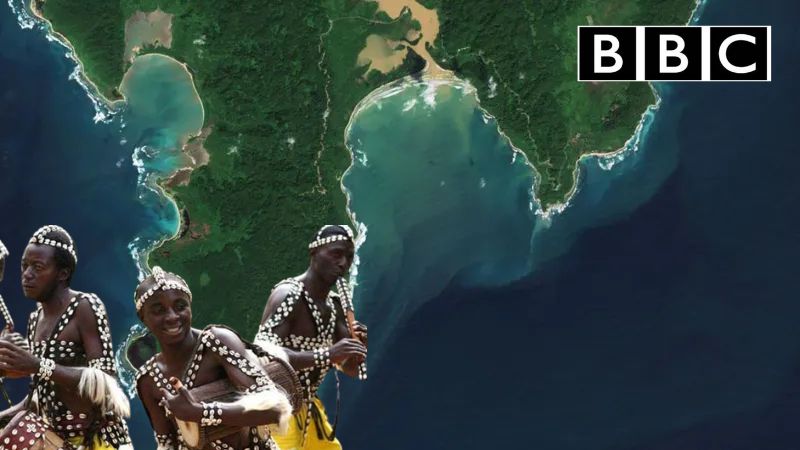Hear about something big and unprecedented happening in India, and the British Broadcasting Corporation (BBC) will maliciously distort it. With their experts’ quoted pieces and a long list of concerns that carry an appeal for human issues, it tries to craft a propaganda piece to hide the fact that it envies India.
One of the oldest media houses, once boasted as a paragon of journalism, BBC’s veil has shredded over the years making its colonial mindset glaringly visible. Since India’s Independence, BBC has been notoriously making efforts to undermine country’s prestige and present it in bad light around the world.
In the latest example of its crusade against India, the Imperial broadcaster has raised questions on India’s strategically important Great Nicobar Island development project worth Rs 72,000 crore. As usual, it has tried to encash human issues by disinformation.
According to the colonial-era broadcaster’s latest report, “India’s Hong Kong-like port may wipe out ancient tribes.” It has argued that the project threatens to push islanders on the brink of ‘extinction’, which is inarguably an exaggerated claim made by taking leverage of media rights.
The BBC deliberately ignored to mention the fact that the govt project will leave 82 per cent region untouched which is far more than two-third standard requirement. Union Environment, Forest and Climate Change Minister Bhupender Yadav echoed this when the Congress party raised this concern in the Parliament in August this year.
Moreover, the government has also planned to substitute afforestation of native plantations on non-notified forest land, arid regions and urban areas.
BBC also highlighted that Andaman and Nicobar Islands are home to some of the most vulnerable tribes. These include the Jarawas, North Sentinelese, Great Andamanese, Onge, and Shompen. Among them Shompen would be mostly affected by the project. The reason given by the BBC for that is the shrinking of their land, loss of their culture.
However, the BBC need to realise that Nicobar is Indian territory and its inhabitants are Indians and the project will not be implemented in line with the British Imperial development that predominantly focused on cultural decimation. Instead, the government-formed High-powered committee (HPC) has thoroughly assessed the project’s impact on tribal communities, recommending the de-notification of the tribal reserve only under conditions that protect the interests of the Shompen.
The government project provisions adequate consultation with relevant authorities, confirming that the project will not disturb or displace any members of the Shompen tribe.
Despite this, the BBC published a one-sided story which itself is proof that it is biased against India.
Besides, it poses questions on India as if the development at the expense of virgin biodiversity is only visible in India. In fact, it is the product of contemporary world trade order that neither India created nor controls. The competitiveness of markets, inescapable demand and cruciality of supply chains, globalised trade in imports and exports and development of transitional hubs are among some of the reasons behind the loss of biodiversity.
However, flag bearers of selective journalists may argue that most visible effect on biodiversity is visible in developing countries like Indonesia, China and India among others, which is by and large correct. But these losses are still less when the time frame is expanded to over 200-300 years.
As per reports, the UK is the most biodiversity depleted country in the world as it saw wide destruction of habitats in the 17th and 18th century, seems like time for some introspection for BBC.
So, while the pace of development in countries like India may show more danger to habitat, it is actually far less to developed countries when compared retrospectively. Also, the development in India today is, as said earlier, based on deliberations on how to mitigate the risks unlike the UK, which exploited biodiversity in the name of development.
Why does India want to develop Greater Nicobar?
While the BBC has been notorious for its anti-India tirade, the angst in this case stems from the fact that the development project will be a major boost for India is widening and solidifying its stronghold in the Indian Ocean Region (IOR) and devoid of Western hegemony kind of dominance, it will be the leading player in the region. It is pertinent to note that the US, UK and other Western powers want India to not grow out of proportions and to maintain their own sphere of influence in this strategically important region.
For those unversed, the geographic location of the island is crucial as it is situated near the Malacca Strait, a narrow pass through which over world’s 70 per cent trade passes. The development will also act as a transshipment hub for India, augmenting efficiency and expansion of supply chains. India’s reach to the Indian ocean will certainly expand that would eventually benefit it.
So basically, it is inevitable for India to keep the project still for long. New Delhi will have to move forward with this project, the best it can do is ensure that native rights don’t get hurt, which obviously it is doing.
The BBC report on the other hand again made it abundantly clear that its long history is the only plank on which it could claim of being a journalism venture, otherwise its biased and one-sided reportings say all about its media ethics and journalist pursuit.

